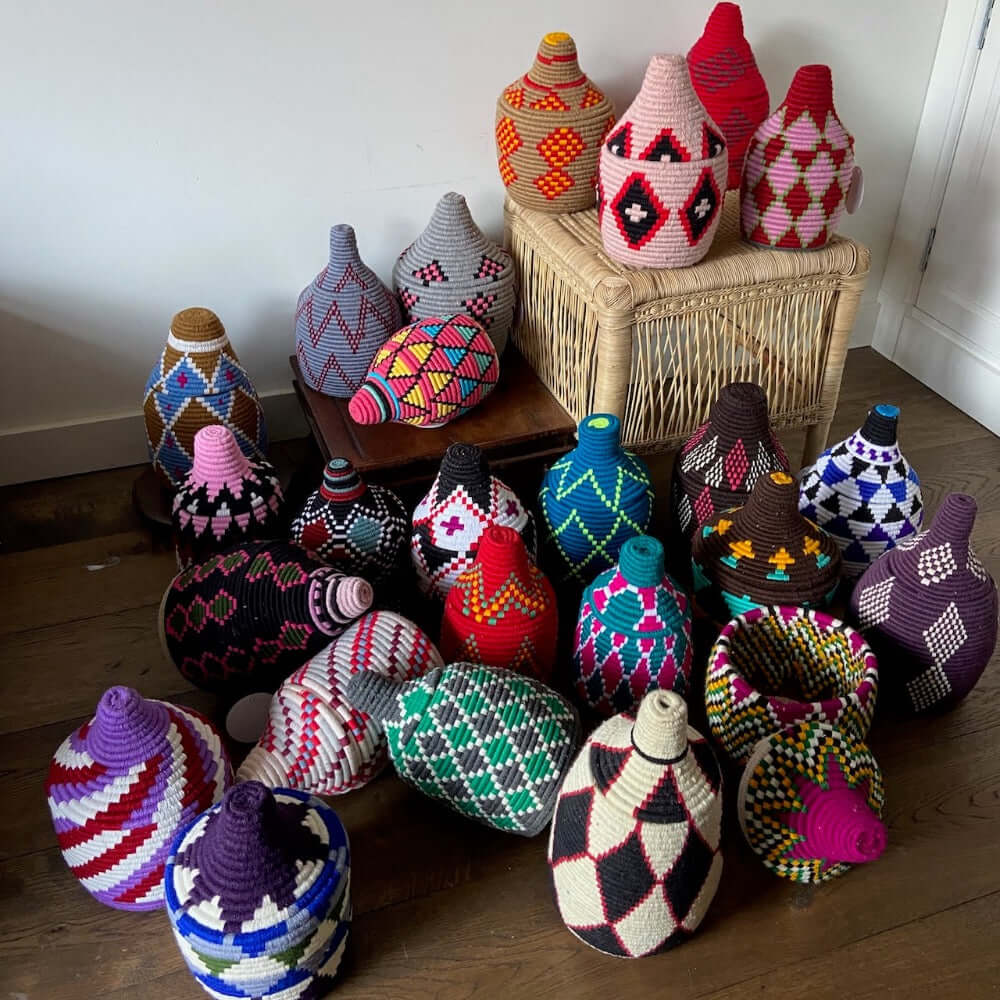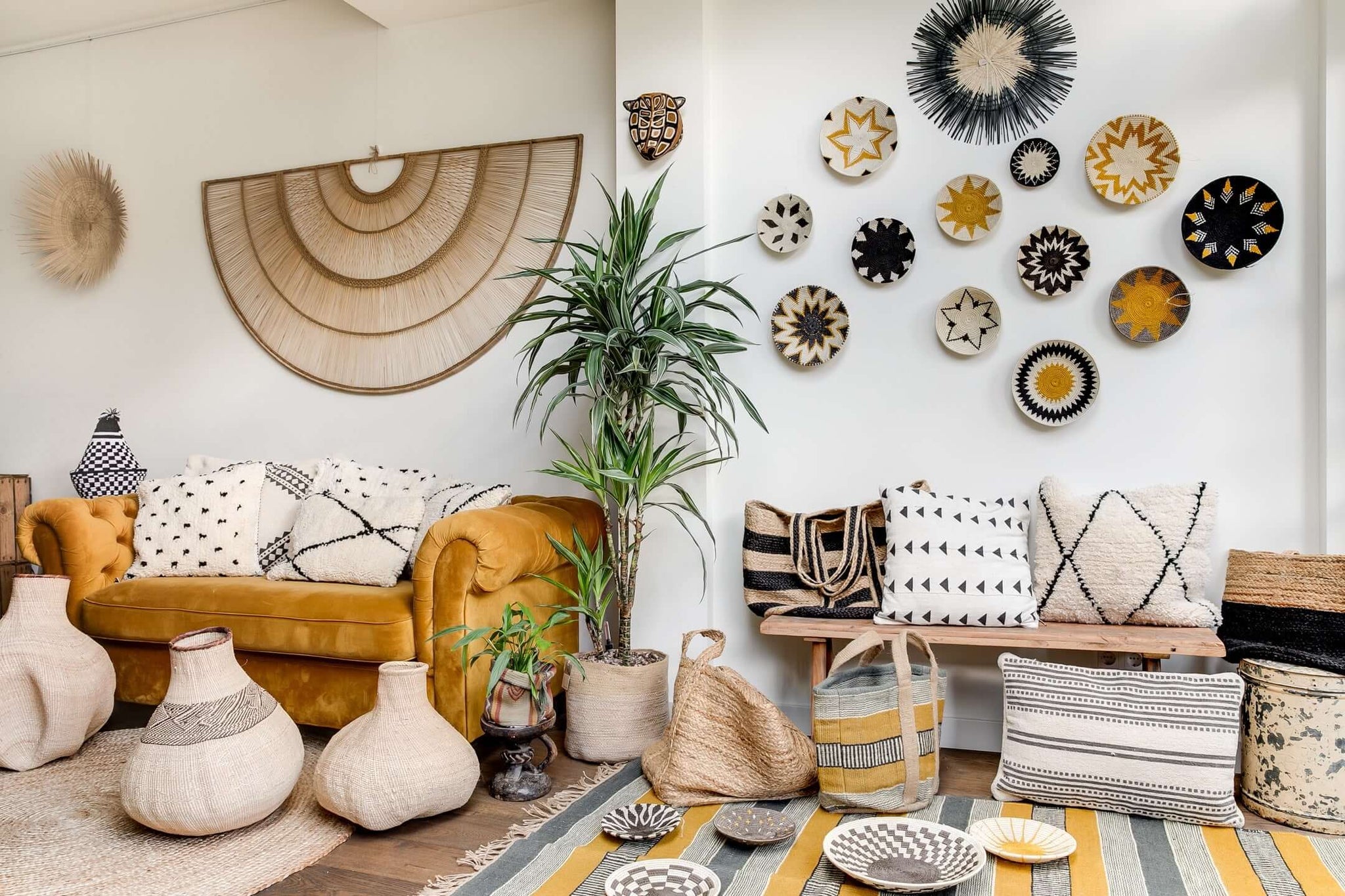
Ontdek de Kunst van Berberse Mandenvlechten: Een Culturele Traditie met Symbolische Betekenis
Posted on
Het maken van Berbermanden is een traditionele ambacht die van generatie op generatie is doorgegeven onder de inheemse Berberbevolking van Noord-Afrika, met name in Marokko en Tunesië. Deze manden worden met de hand geweven met natuurlijke materialen zoals palmbladeren, gras, wol en riet. In deze blogpost zullen we het proces van het maken van Berbermanden en hun betekenis in de Berbercultuur verkennen.
De Maak van Berbermanden
Het proces van het maken van Berbermanden begint met het verzamelen van natuurlijke materialen uit de lokale omgeving. De meest voorkomende materialen zijn palmbladeren, gras, riet en wol. De bladeren worden vervolgens zorgvuldig geselecteerd en schoongemaakt voordat ze in ingewikkelde patronen worden gevlochten, meestal door de mannen in de familie. Het weefproces vereist veel vaardigheid en geduld. De wever moet de bladeren zorgvuldig manipuleren om de gewenste vorm en het patroon van de mand te creëren. Het maken van één kleine mand duurt daarom een paar dagen.
Zodra de mand is geweven, versieren de vrouwen de mand met kleurrijke ontwerpen of symbolen die belangrijk zijn voor de Berbercultuur. Hiervoor gebruiken ze dikke naalden en reststukken wol. Alle manden zijn uniek. Berberstammen in het zuiden van Marokko versieren expressiever dan de traditionele Arabische stijl, en kleurrijker. Deze stijl wordt gekenmerkt door tribale vormen, geometrische patronen, lineaire strepen en een explosief gebruik van kleurcombinaties. Aangezien we deze stijl geweldig vinden, komen de meeste Berbermanden van Mayala Home uit het zuiden van Marokko.
Betekenis van Berberse Mandjes
Berbermanden hebben een lange geschiedenis en zijn een belangrijk onderdeel van de Berbercultuur. Ze worden voor verschillende doeleinden gebruikt, waaronder het dragen van goederen, het opslaan van voedsel (zoals platbroden en rijst) en ook als decoratieve items. In de Berbercultuur worden manden vaak als geschenken gegeven tijdens bruiloften of andere belangrijke ceremonies. Ze worden ook gebruikt in traditionele dansen en andere culturele evenementen.
Deze manden zijn ook prachtige plantenpotten, ideale opbergruimte voor badkameraccessoires, decoratieve eyecatchers, een plek om kleine items zoals sleutels in te doen.. Ze zijn niet alleen decoratief, maar ook multifunctioneel, unieke stukken.
De ingewikkelde ontwerpen en patronen op Berbermanden zijn significant omdat ze vaak symbolische betekenissen hebben. Sommige patronen kunnen bijvoorbeeld vruchtbaarheid vertegenwoordigen, terwijl andere bescherming of geluk kunnen vertegenwoordigen. Het gebruik van natuurlijke materialen heeft ook een spirituele betekenis, omdat het een verbinding met de aarde en het milieu vertegenwoordigt.
De ambachtslieden achter de Berbermanden
Net als bij veel ambachtelijke processen, worden de manden in het huis van de ambachtsman gemaakt, als een integraal onderdeel van het thuiswerk en de familie. Ze worden vaak verkocht op traditionele markten door lokale ambachtslieden die deze ambacht al generaties lang beoefenen. Veel van deze ambachtslieden werken in coöperaties die traditionele ambachten bevorderen en een duurzame bron van inkomen voor lokale gemeenschappen bieden. Mayala Home zorgt ervoor dat de ambachtslieden een eerlijke prijs voor hun stukken krijgen, zodat dit prachtige, traditionele ambacht kan voortleven.
Conclusie
Het maken van Berbermanden is een belangrijk onderdeel van de Berbercultuur en is van generatie op generatie doorgegeven. De ingewikkelde patronen en ontwerpen op deze manden hebben symbolische betekenissen en vertegenwoordigen een verbinding met de omgeving. De verschillende kleurcombinaties maken elke mand ook uniek. Het kopen van deze manden ondersteunt lokale ambachtslieden en bevordert duurzame economische ontwikkeling.
Dus.. zorg ervoor dat je de collectie van Mayala Home met kleurige Berbermanden bekijkt!
Snelle links
Neem contact met ons op
Burgemeester Sandbergstraat
2013 BR Haarlem, NL
info@mayala-home.com
+31 6 8199 2120
Mayala Home is een webshop. Afhalen in Haarlem is mogelijk op afspraak.
We hebben nu ook een hoekje in de shop-in-shop Swan Market Store in Haarlem! Kom langs! Mocht je iets specifieks willen zien in de winkel, neem dan contact met ons op.


Laat een reactie achter: